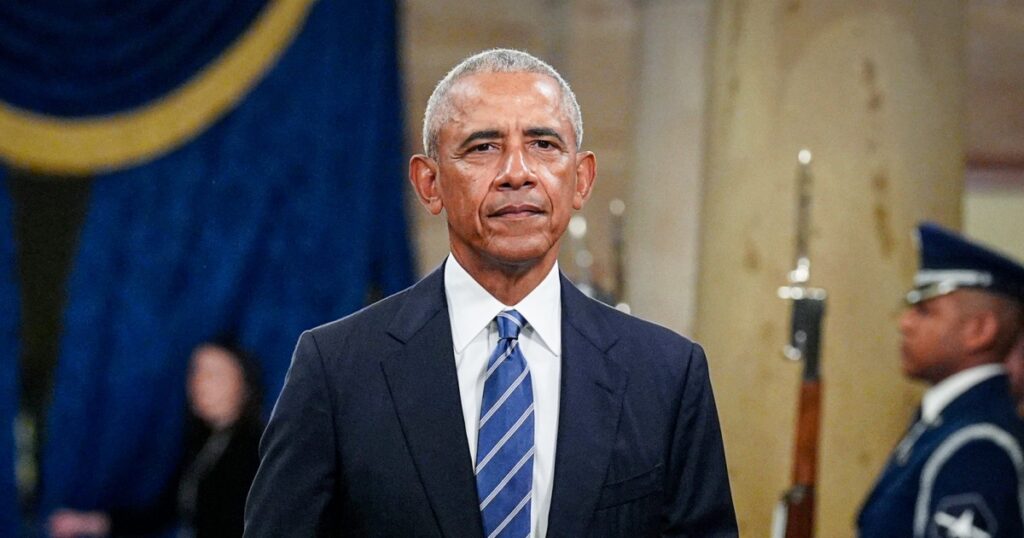

Welcome to the online version of From the Politics Desk, an evening newsletter that brings you the NBC News Politics team’s latest reporting and analysis from the White House, Capitol Hill and the campaign trail.
Happy Tuesday and welcome back from the long weekend. In today’s edition, we explore how Barack Obama’s political orbit is losing some of its clout. Plus, Steve Kornacki breaks down where New Jersey’s traditionally powerful Democratic county parties stand in the state’s crowded gubernatorial primary.
Sign up to receive this newsletter in your inbox every weekday here.
— Adam Wollner
🗣️ We want to hear from you!
Have a question for the NBC News Politics Desk about Republicans’ “big, beautiful bill” as it makes its way through Congress, next month’s elections in New Jersey, or anything else happening in the world of politics?
Send your questions to politicsnewsletter@nbcuni.com and we may answer them in a future edition of the newsletter.
Obama world loses its shine in a changing — and struggling — Democratic Party
By Natasha Korecki, Jonathan Allen and Allan Smith
There’s a growing sentiment across a Democratic Party searching for a path forward: Team Obama’s bloom may be falling off the rose.
More Democrats are openly criticizing former President Barack Obama’s strategists and consultants — including David Plouffe, who played a key role in Kamala Harris’ 2024 campaign — who were long treated as the high priests of their party’s politics.
Democratic National Committee officials at a news event last month blamed Obama’s lack of investment in state parties over his two terms for setting back local organizing, with the party still feeling the effects.
The so-called Obama coalition of voters — less politically engaged voters, younger voters and voters of color — is no more. In 2024, each of those groups shifted toward Donald Trump in high numbers.
Going forward, it could mark a clean slate for a party whose course for nearly two decades cascaded from decisions Obama had made.
It was Obama who chose Joe Biden as his vice president, offering him the elevated perch that set up his 2020 election and his aborted 2024 re-election campaign. Obama selected Hillary Clinton as his secretary of state, then anointed her for the Democratic nomination in the 2016 race against Trump. The operatives Obama and his top aides empowered have carved out leading, decision-making roles at the top of the Democratic Party since then.
Obama himself remains a force in the party, filling stadiums and commanding the attention of major donors. Indeed, the DNC is in talks with New Jersey Gov. Phil Murphy to host Obama for a fundraiser at his home, according to two people with knowledge of the planning, which is still in its early stages.
But even the former president’s luster was showing signs of fading last fall, a phenomenon that threatens to persist as the next crop of young voters ages into adulthood. When the 2028 presidential election arrives, it will be 20 years since Obama’s first victory. At that point, more voters will have come of age in the era of Trump than in the era of Obama.
Read more from the team →
Democrats in disarray, cont.: 1-vote victory for Trump’s big bill inflames Democratic clash over aging leaders, by Sahil Kapur
New Jersey governor’s race tests the staying power of Democrats’ county machines
By Steve Kornacki
One metric has traditionally been all but definitive when it comes to New Jersey Democratic contests: the county line. And by that metric, one candidate is running circles around the others ahead of the June 10 gubernatorial primary: Rep. Mikie Sherrill.
Sherrill has won endorsements from 10 of the state’s 21 county Democratic organizations, including three of the four largest. Only two of the other five candidates in the race, Rep. Josh Gottheimer and former state Senate President Steve Sweeney, have notched any county endorsements.
The counties in which Sherrill has won support account for nearly 60% of all registered Democrats in the state. They include the county in which her 11th Congressional District is based, Morris, and the two others that it touches, Passaic and Essex. Gottheimer, whose 5th District is based in Bergen, also represents part of Passaic and Sussex. And Ras Baraka is the mayor of Newark, the largest city in Essex (and the state). Sweeney, the only candidate from South Jersey, has largely swept that region, where the county organizations typically act as a bloc.
What has traditionally made these endorsements so meaningful is the preferred ballot position that came with them. An endorsed candidate would run at the top of the Democratic county organization’s official line, an official-looking and impossible-to-miss column that would also include a host of familiar local names running for lower offices. Names of the other candidates would be listed by themselves, often in the far reaches of the ballot.
The results were predictable: Candidates running off the line almost never won and generally got blown out. The last open Democratic gubernatorial primary was essentially settled a year before any votes were cast, when the largest county organizations threw their support to now-Gov. Phil Murphy.
But a successful lawsuit last year and a new law signed by Murphy in March have changed the game. The line is gone and county parties can no longer list all of their endorsed candidates in a special column. Primary ballots now list candidates by the office they are seeking. One of the questions heading into June’s primary is how much this has diminished the power of county endorsements.
Read more from Steve →
🗞️ Today’s top stories
- 🏫 Trump vs. Harvard: The Trump administration plans to ask all federal agencies to seek ways to end their contracts — worth an estimated $100 million — with Harvard University. Read more →
- 📻 Trump vs. NPR: National Public Radio sued Trump over his effort to cut the nonprofit broadcaster’s federal funding. Read more →
- 💉 New sheriff in town: Health Secretary Robert F. Kennedy Jr. announced that the CDC is no longer recommending routine Covid vaccines for healthy pregnant women and children. Read more →
- 📝 Pardon politics: Trump pardoned Paul Walczak, who had pleaded guilty to tax crimes, weeks after his mother attended a fundraising dinner that cost $1 million per person for a political group that backs the president, The New York Times reports. Read more →
- 📈 Market mania: Stocks climbed following Trump’s announcement that he was postponing the deadline to impose tariffs on the European Union. Read more →
- ☀️ I have confidence in sunshine: A survey finds consumer confidence was higher in May than April amid optimism about potential trade deals. Read more →
- ⚖️ SCOTUS watch, part 1: The Trump administration asked the Supreme Court to make it easier for officials to deport convicted criminals to “third countries” that are not their nations of origin. Read more →
- ⚖️ SCOTUS watch, part 2: The Supreme Court declined to hear a student’s challenge to his middle school barring him from wearing a T-shirt that read, “There are only two genders.” Read more →
- ⚖️ SCOTUS watch, part 3: The Supreme Court also rejected an appeal from Native Americans who said a new copper mine project would violate their religious liberties, arguing that the project would destroy a sacred site for ceremonies. Read more →
- ⬅️ Back to the future: FBI Deputy Director Dan Bongino said the bureau will direct more resources to Biden-era cases, including allegations of cocaine use at the White House and a leaked Supreme Court opinion, as well as the pipe bombs found in Washington, D.C., on Jan. 6, 2021. Read more →
- 🗳️ Put me in, coach: GOP Sen. Tommy Tuberville, a former Auburn football coach, officially launched his campaign for Alabama governor. Read more →
- Follow live politics updates →
That’s all From the Politics Desk for now. Today’s newsletter was compiled by Adam Wollner and Bridget Bowman.
If you have feedback — likes or dislikes — email us at politicsnewsletter@nbcuni.com
And if you’re a fan, please share with everyone and anyone. They can sign up here.
 Latest World Breaking News Online News Portal
Latest World Breaking News Online News Portal






